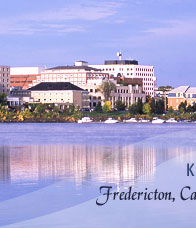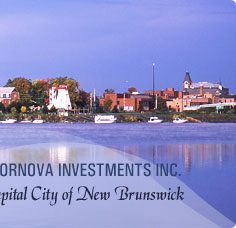New Brunswick clings to immigrants as hope for growth
11/11/2015
Retention rate of those who move to province from abroad has climbed to 67%
A population expert says New Brunswick should strive to do better when it comes to retaining immigrants because they are the province's only hope for growth.
"For us, we have fairly high rates of outmigration and fairly low rates of fertility," says Michael Haan, who is leaving his job as associate professor at UNB to take a post in Ontario.
"So we are at the very forefront of what we call growing old age dependency ratios in Canada."
Since New Brunswick introduced its population growth secretariat in 2007, Haan says the province has improved its track record when it comes to recruiting newcomers.
"Any of the last two or three years, we were actually recruiting more immigrants than we did throughout the entire 1980s," he said.
"So not only are we bringing in a lot of people relative to what we used to in the past, but also we have fairly high success rates in terms of retention and they're improving all the time."
Haan says the overall immigrant retention rate has climbed from 50 per cent in 2005 to 67 per cent a decade later. He credits developing infrastructure such as settlement services, multicultural centres, as well as language and employment programs.
Mike Timani, the president of the New Brunswick Multicultural Council, says he'd like to see that success rate climb to 85 per cent.
But he says the federal government appears to be growing more restrictive in its policies, especially when it comes to temporary foreign workers.
"Basically, they've put the screws on," says Timani.
"And we need to release that."
Timani says he started his Moncton bakery, Fancy Pokkets, with three employees.
Now he says he supports 60 workers and their families and there's a positive economic spinoff when his company purchases supplies.
"There's a perception out there that immigrants do take business away from Canadians and that is not true. Actually, there are a lot of immigrants that support the economy."
Timani says immigrants are better served when they are properly educated about their destination and when they get help on the ground.
Jerry Yu, the president of the Saint John Chinese Cultural Association, says that support should also include better advice and guidance for entrepreneurs.
Yu arrived in New Brunswick 10 years ago as a skilled worker in the technology sector.
He came over with his wife who is now employed making sushi at a grocery store. And he says, they have two children, born in New Brunswick. He hopes they will stay.
Yu says about half the Chinese immigrants that he meets in New Brunswick tend to leave for larger centres, including Toronto, Vancouver and Calgary.
He says it's partly because they come up with unviable business plans conceived after short, exploratory visits to New Brunswick.
"Before they come here they make a business plan, how they are going to invest here," says Yu.
"But when they come here, they most likely realize it will be different than they thought."
Yu says his association tries to help but they're just volunteers.
Haan says the provincial government is keen to promote successful immigration to counter the negative trends in New Brunswick's population.
Haan says those pressures could soon be acute.
He says the children of the baby boom generation are now in their 20s or 30s.
Haan says when their parents' generation hit that high mobility age, roughly 150,000 of them left the province.
Meanwhile, an internal study presented to the Department of Post Secondary Education, Training and Labour, suggests the province should brace for an exodus from the workforce.
It says 115,000 New Brunswickers will be leaving their jobs over the next decade, mainly due to retirement.
By Rachel Cave, CBC News
|





